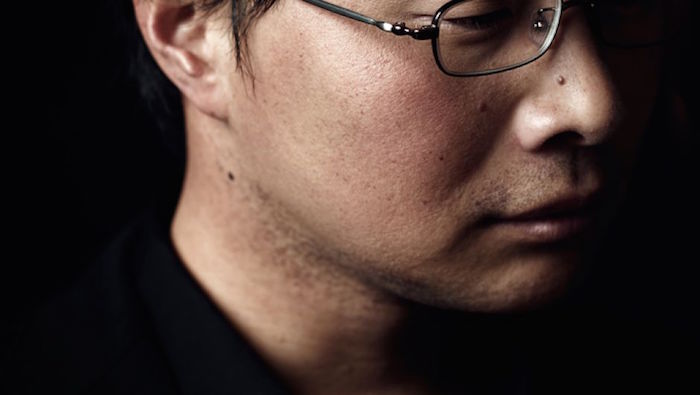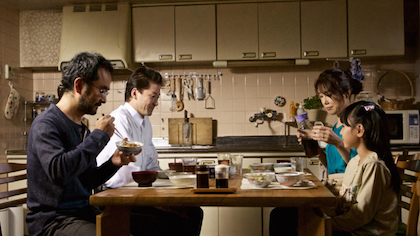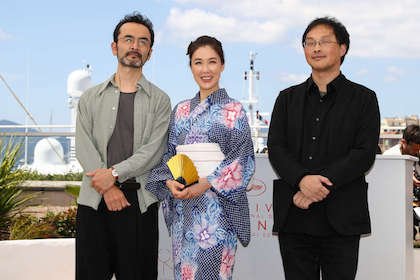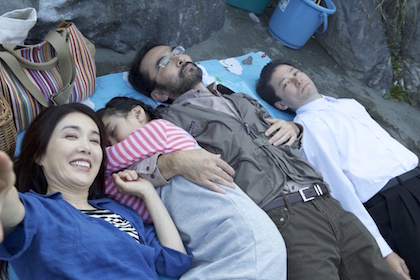HARMONIUM: THE KOJI FUKADA INTERVIEW.
 Monday, July 18, 2016 at 5:57AM
Monday, July 18, 2016 at 5:57AM Revisiting elements of his 2010 drama Hospitality, writer-director Kôji Fukada crafted one of the 2016 Cannes Film Festival’s breakout titles with his latest, Harmonium (Fuchi ni tatsu). The chilling, slow burn pyscho-drama tells of the disintegration of a seemingly stable family unit when a visitor from a dark past settles amongst them. Cited by Variety as a work of “cinematic and intellectual rigour”, the film earned the Japanese auteur the Un Certain Regard Jury prize. In the wake of the triumphant screening, the 36 year-old director sat with SCREEN-SPACE in a sunny, manicured yard just off The Croisette to talk about his current work, which has it’s Australian premiere next month at the Melbourne International Film Festival…

SCREEN-SPACE: You’re cinema is elegant, refined yet deeply affecting. Names such as Eric Rohmer and Robert Bresson have been cited as key influences. Which filmmakers have inspired your work?
Fukada: To be spoken of in the same sentence as those masters is too great an honour. My first influence was my father, as he was a huge film lover. I was exposed to international cinema from a very young age. My childhood home was filled with VHS tapes. I’ll never forget one night, when I was about 14 years of age, I watched two films back-to-back – Marcel Carne’s Chicken Feed for Little Birds and Victor Erice’s The Spirit of The Beehive. Over time, I have recognised that one of my key influences has also been Theo Angelopoulos, a master and pioneer of cinema. His social commentary and artistic achievements come from the highest cinematic level.
 SCREEN-SPACE: How did Harmonium develop?
SCREEN-SPACE: How did Harmonium develop?
Fukada: It started with a simple synopsis that I wrote in 2006. I had difficulty getting finance for it so, in 2010, I made a film called Hospitality. It is essentially the first half of what you see in Harmonium, like a pilot version of it. It’s also about an intruder coming into the life of a family and disrupting their relationships. When our producer, Koichiro Fukushima, saw Hospitality he came on board and Harmonium began to take shape. It took us 10 years to make the film, so it is a thrill to finally present it here in Cannes. (Pictured, right: a scene from Harmonium with, from left, Kanji Furutachi, Tadanobu Asano, Mariko Tsutsui and Momone Shinokawa).
SCREEN-SPACE: Is there any aspect of your story or characters that will resonate most profoundly with Japanese audiences?
Fukada: If anything, it is the husband/father character of Toshio, a patriarchal figure who does not comfortably verbalize his emotions or communicate with the other family members. He is that traditionally conservative Japanese father figure, though I’m sure they exist in other countries as well. Something intrinsically Japanese is the role that the husband undertakes when children arrive, adopting the father role to a much greater extent that the husband role. Similarly, the wife very much becomes the ‘mother’ figure. Instead of coalescing as a unit, a ‘family’, they become individuals bound to the expectations of their new roles.
 SCREEN-SPACE: Is this duality, this thematic strand that suggests even the most closely-knit unit is only as strong as the individual, indicative of your beliefs?
SCREEN-SPACE: Is this duality, this thematic strand that suggests even the most closely-knit unit is only as strong as the individual, indicative of your beliefs?
Fukada: It is very difficult to distinguish myself from my work. They represent how I view the world and how I view humanity. In this story, we have a community of people we call a ‘family’, the very smallest kind of human community that exists. But what I wanted to explore was how the individuals within this seemingly close community still possess an essential solitude. That represents my view on human beings. (Pictured, right; Fukada, far right, with his actors Kanji Furutachi and Mariko Tsutsui attending the 2016 Cannes Film Festival).
SCREEN-SPACE: You draw naturalistic performances from the cast. Were you able to work with them for long periods in the development of the script and in rehearsal?
Fukada: We had a short rehearsal period, perhaps 2 or 3 days, but with such a modest budget and with the time constraints that rehearsals place on actors, our planning was limited. But there were many hours of in-depth discussion with the cast, especially Kanji Furutachi, with whom I have collaborated on four projects. I don’t want my actors to just do a read-through, or be bound by their actions in a single room. I don’t feel there is a lot of value to rehearsal unless it is very near to the on-set experience, so I will prefer to rehearse on location or on a finished set. And that’s very difficult and expensive to do, to be on-set and not be filming.
 SCREEN-SPACE: Are your sets collaborative environments or are you very clear with your cast as to their roles in your vision?
SCREEN-SPACE: Are your sets collaborative environments or are you very clear with your cast as to their roles in your vision?
Fukada: I don’t want the actors to be an alter ego of me. I want them to exist as individuals who are living in the moments they create. So rather than ask of them to build a character in a particular way, be that physical or emotional, I ask them be present, with their cast mates, just as you and I are now. It is essential that they not act, but react and interact with each other. That all begins with my role as writer and director. I must ensure the actors are honest and truthful in any moment (and) that complexity has to be there in my screenplay. (Pictured, right; a scene from of Harmonium).
SCREEN-SPACE: You eschew close-ups, maintaining a very respectful distance between the actor and your lens. Why so?
Fukada: I keep the relationship between the actor and the camera very simple. My camera keeps a certain distant from the actors because being in close proximity feels as if I am trying to explain or define the intent of the scene to the audience.
SCREEN-SPACE: Looking more broadly at your homeland’s film industry, is it a happy place for independent cinema and your auteur peers?
Fukada: It is very difficult for arthouse films in Japan. We don’t have an organising body, like France’s CNC or South Korea’s KOFIC, which negotiates subsidies and provides administration for the sector. Bodies like that exist to promote diversity, which is crucial to a vibrant film sector. These organisations understand audience needs, so a genre film can be produced and marketed to a large audience at the same time that an arthouse film with specialised needs can be promoted to a niche sector and succeed. That balance allows for a very rich cinematic culture, both commercially and critically. In Japan’s economic system, it is very difficult to make such a system work; if a film does not recoup its cost, it becomes very hard for the creative people involved to survive.
Ticket and session information for Melbourne International Film Festival screenings of Harmonium can be found attheevent's official website.
 Cannes,
Cannes,  Film Festival,
Film Festival,  Japanese Cinema,
Japanese Cinema,  MIFF
MIFF 